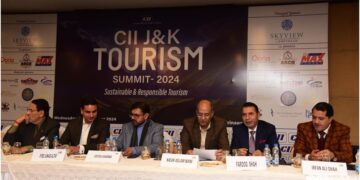Srinagar: A major political row erupted after the National Conference (NC) vice-president Omar Abdullah alleged that the Bhartiya Janata Party (BJP)-led union government had asked the chief secretary to change the government business rules that would give sweeping powers to J&K’s lieutenant governor (LG).
The controversy erupted days after the culmination of the assembly election in Jammu and Kashmir which recorded 63.88 per cent voter turnout and less than three months after the union government amended three post-Article 370 rules to extend the scope of LG’s administrative powers.
In a post on X, formerly Twitter, Abdullah, the former chief minister of J&K, alleged that the saffron party had directed the chief secretary to change the government rules that would “curtail” the CM’s powers.
‘Information has come to me from within the Secretariat’
“The BJP has clearly accepted defeat in J&K. Why else would the chief secretary be assigned the duty to change transaction of business rules of the government to curtail the powers of the Chief minister / elected government and assign the same to the LG? This information has come to me from within the Secretariat. Officers would be well advised to resist any pressure to further disempower the incoming elected government,” he said.
In response, Union Home Minister Amit Shah’s office said that there was “absolutely no such proposal” as alleged by Abdullah, terming his claim “misleading and speculative”.
“Mr. @OmarAbdullah’s tweet is misleading and speculative in nature. There is not even an iota of truth, as there is absolutely no such proposal. The Jammu and Kashmir Reorganization Act of 2019 passed by the Parliament of India provides for notifying the transaction of business rules, and the same was notified in the year 2020. The people of J&K have wholeheartedly supported the efforts of the Government of India to bring in a democratically elected government through the historic free and fair election process in which the citizens participated enthusiastically,” the office of Home Minister Amit Shah said in a post on X.
Earlier, the central government refused to provide to The Wire a copy of the file notings and correspondences of the amendments made in the government business rules that extended LG’s administrative powers, citing safety issues and the confidentiality clause under Section 8(l)(e) and 8(l)(g) of the RTI Act, 2005.
The government’s refusal to share the details had riled the transparency activists who termed the move as “bewildering”
Ahead of the assembly election, the union government extended LG’s powers by setting up new rules through an executive notification, which had triggered an uproar in the union territory where the NC and Peoples Democratic Party among other political outfits accused the BJP of undermining J&K’s future elected governments.
The new rules, which were notified by President Droupadi Murmu and issued in a notification by the Ministry of Home Affairs on July 12, amended “Union Territory of Jammu and Kashmir (Second Amendment) Government Business Transaction Rules, 2024”.
The notification, second of its kind after the erstwhile state was divided into two Union territories, was issued under section 55 of Jammu and Kashmir Reorganisation Act, 2019 (34 of 2019) read with the proclamation dated October 31, 2019 under section 73.
Centre’s nod required to even appoint J&K’s home secretary
On February 24, the Union home ministry said that President Murmu has amended Rule 50 of the Transaction of Business of J&K, 2019 through ‘Transaction of Business of the Government of Union Territory of Jammu and Kashmir (Amendment) Rules, 2024”.
Clause b of sub-rule 2 of Rule 50, which called on the LG to “make a prior reference” to the home ministry in the matter of the appointment of the J&K’s Chief Secretary and Director General of Police was amended to require the centre’s nod in the appointment of J&K’s home secretary as well.
The Union government, led by the BJP, seems to be tightening its grip on J&K after the Supreme Court directed it to conduct the assembly election in the Union territory before the end of September, according to political analysts who believe that the probability of the saffron party coming to power was very poor.
After taking over J&K in 2018, the union government has engineered Jammu and Kashmir’s political and electoral boundaries with the hope of returning to power once the much-anticipated results of the assembly election is declared which was held for the first time in a decade.
Besides changing the system of political reservations in Jammu and Kashmir to favour its electoral arithmetic, the BJP-led union government has also empowered the LG to nominate five members to the legislative assembly who are likely to be cleared by the political dispensation in the union home ministry, according to analysts.
However, with a resurgent Congress giving tough electoral fight to the BJP in Jammu, the Dogra heartland of J&K and a saffron party stronghold, and the party’s allies in Kashmir facing the heat of the National Conference, which is expected to emerge as the single largest party, all eyes are focussed on October 8 when the election results are scheduled to be out.





















